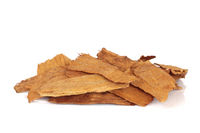Astragalus membranaceus
| See Also | Botanical Monographs |
|---|
Astragalus (Astragalus membranaceus) has been used for centuries to support and enhance the immune system, as an adjunctive therapy in cancer and to treat the common cold. To explore the characteristics, medicinal uses and prescribing considerations of this herb in more detail, check out the references indicated.[1], [2]
Contents
Characteristics
- Common Names: Milk-vetch root, Membranous vetch, Yellow vetch, Huang Qi
- Family: Fabaceae
- Habitat: Native to Mongolia, northern and eastern China and Tibet; thrives in well-drained soil in sunny areas
- Parts Used: Roots from 4-7 year old plants
- Constituents: Polysaccharides (astragalan), Triterpene glycosides/saponins (astragalosides)
- Medicinal Actions:
- stimulates adrenocortical activity, cardiac tonic
- Saponins in general: adaptogen, alterative, antimicrobial ( antibacterial, antiviral), antihelmintic, antifungal, anti-inflammatory, diuretic, expectorant, hepatic, immunomodulator,
Uses
Historical Uses:
In Traditional Chinese Medicine, Astragalus has been used for at least 2000 years as Panax ginseng (Ginseng) for younger people.
Medicinal Uses:
- Immune Support:
- Upper respiratory tract infections, depressed immune system, allergies, autoimmune disease, General health tonic
- Stress ailments including:
| Article | Astragalus and astragalus- based herbal combinations: Adjunctive role in cancer management?, IHP, September 2009 |
|---|
- Adjunctive therapy to chemotherapy and radiation treatments
Prescribing Considerations
The information provided is intended to augment the treatment from a naturopathic doctor or other trained medical professional. Although most herbs are generally safe, it is recommended that you avoid self-prescribing especially when there is an underlying medical condition or if you are on any prescription medications.
Formulations and Preparation
- Dried root (or as a tea) - Adult dose normally 9-15 g daily in divided doses
- Tincture (1:5) - 2-6 mL three times daily
- Powdered solid extract (2:1) - 250-500mg three times daily
- Astragalus is a common herb used in the Change of Season Soup
Safety
The safety and prescribing considerations for Astragalus include:[4] [5]
- Generally regarded as safe.
- Side-effects are not generally seen.
- Contraindicated in acute infection as it may be aggravated (empirical).
- Drug-Herb Interactions.
- Acyclovir and Related Purine Nucleoside Analog Antivirals - Potential or theoretical beneficial or supportive interaction with professional management; Astragalus promotes T helper cell type (Th1) immunity therefore possible additive antiviral activity against herpes simplex virus type 1 (HSV-1) (experimental support only; interaction not established clinically).
- Aldesleukin (IL-2) - Potential or theoretical beneficial or supportive interaction with professional management, preventative or reduction of drug adverse effect; Astragalus may synergistically increase effects of rIL-2 (experimental evidence only; interaction not clinically established).
- Cyclophosphamide and Related Myelosuppressive Chemotherapy, especially Alkylating Agents - Prevention or reduction of drug adverse effect, beneficial or supportive interaction with professional management, bimodal or variable interaction with professional management; Astragalus promotes myelopoiesis; may protect white blood cell (WBC) counts during chemotherapy with cyclophosphamide, platinum agents, or other myelosuppressive chemotherapies (in nonmalignant disease applications, theoretically an adverse interaction).
- Interferon Alpha (IFN-alpha) - Prevention or reduction of drug adverse effect, potential or theoretical beneficial or supportive interaction, with professional management; Astragalus increases endogenous IFN; can be used to support IFN therapy or potentiate drug, allowing reduced drug dose and increased tolerability (empirical clinical support; no trial evidence).
- Thrombolytic Agents - Potential or theoretical beneficial or supportive interaction, with professional management; Astragalus increases fibrinolytic capacity by promoting tissue-type plasminogen activity; may additively support fibrinolytic drug therapies (interaction not clinically established).
References
- ↑ Boon Heather, Smith Michael (2009) 55 Most Common Medicinal Herbs: The Complete Natural Medicine Guide Second Edition Institute of Naturopathic Education and Research, CCNM Toronto.
- ↑ Godfrey Anthony, Saunders Paul, Barlow Kerry, Gowan Matt (2011) Principles and Practices of Naturopathic Botanical Medicine, Advanced Botanical Medicine. V3 CCNM Press, Toronto.
- ↑ Shen HH, Wang K, Li W, Ying YH, Gao GX, Li XB, Huang HQ (Mar 2008) Astragalus membranaceus prevents airway hyper-reactivity in mice related to Th2 response inhibition. J Ethnopharmacol;116(2):363-9. PMID: 18226482.
- ↑ Stargrove Mitchell Bebell, Treasure Jonathan, McKee Dwight L (2008) Herb, Nutrient and Drug Interactions: Clinical Implications and Therapeutic Strategies
- ↑ Brinker Francis (2010) Herbal Contraindications and Drug Interactions: Plus Herbal Adjuncts With Medicines, 4th Edition Eclectic Medical Publications.
